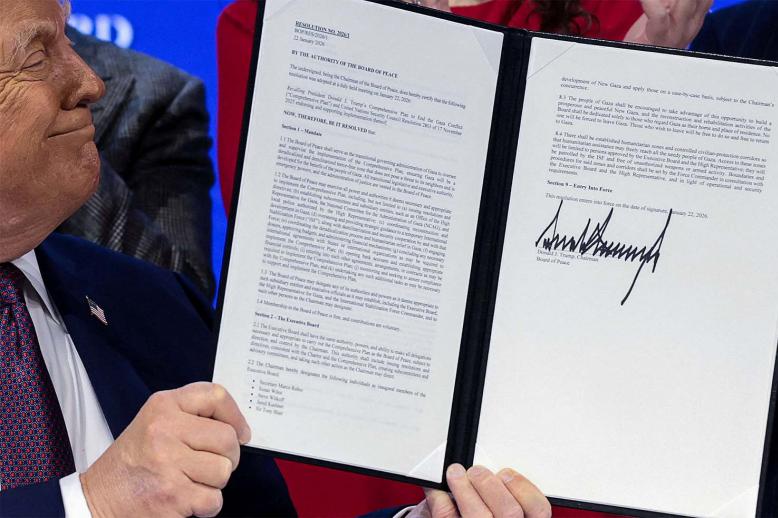Palestinian peace plan postponed indefinitely
Listening to US President Donald Trump talk about a Middle East peace plan along with the intention of Israeli Prime Minister Binyamin Netanyahu for the annexation of Palestinian lands along the shores of the Jordan Valley reminds me of a popular anecdote told around the region.
It goes like this: Trump, Russian President Vladimir Putin and Netanyahu are granted an exclusive audience with God. They have time for a single question each. Trump goes first, thanks the Almighty for his time and asks: “When will America be great again?”
God replies, “Not in your lifetime, Donald.” Trump leaves the room crying.
Putin goes in next and says: “Thank you for the opportunity. I must say that I did not believe you existed for so many years…”
God interrupts him: “Your question, please.”
“My question is: When will Russia become as influential as was the USSR?”
“Not in your lifetime, Vladimir,” says God. Putin goes out crying.
Netanyahu goes in next and asks the Lord: “Dear God, when will there be peace in the Middle East?”
And God runs out crying and saying: “Not in MY lifetime, Bibi.”
The sad thing about this anecdote is how truthful it is.
Since entering office in 2017, Trump had persisted in talking about an undefined path that would lead to a lasting peaceful solution to the Israeli-Palestinian conflict. However, unlike previous US presidents, Trump has devoted very little time to a very complex and difficult issue, one that has stumped several residents of the Oval Office.
This includes President Bill Clinton, who learnt the intricacies of the decades-old dispute so well that he could draw a perfect map of the area in question from memory, including zones known as Area A, Area B and Area C. More important, he understood what they meant.
The foundations of the Israeli-Palestinian dispute are so solidly anchored in the hatred and mistrust that each side retains of “the other” that they render peace becoming a reality all that much harder. Clinton ran out of time and was forced to abandon his efforts at peacemaking in the Middle East.
Ditto for President Barack Obama, who kicked off his peacemaking initiative months before moving into the White House, naively thinking he could have it wrapped up shortly after being sworn in.
Even more naive was Trump, who thought he could insult the Palestinians by appearing to be bluntly pro-Israeli, by shutting down the Palestinian representation bureau in Washington and, most important, by moving the US Embassy from Tel Aviv to Jerusalem and still believe he could act as an impartial arbiter in this very sensitive dossier.
This explains why Trump has been dragging his feet in revealing details of his peace initiative.
Trump promised to unveil his plan after invoking Ramadan as a timeframe and to avoid creating interference with the scheduled Israeli elections earlier this year. He is procrastinating more. The excuse this time is more scheduled Israeli elections.
We open yet another negative chapter in the Israeli-Palestinian conflict, one that will complicate the problem further. Indeed, Netanyahu promised to annex more Palestinian lands if he wins this election. If that were to occur, you can certainly kiss goodbye any hope of peace in the foreseeable future.
The rationale is that the perception of fairness towards the Palestinians could imperil Netanyahu’s chances of re-election. Regardless of the outcome of the Israeli vote, we are now entering the nebular zone of American politics — presidential elections — a time when nothing seems to exist outside Washington Beltway politics.
The 2020 US presidential elections will justify another postponement. While Netanyahu is pursuing annexation policies with the support of Trump, no American presidential candidate is supposed to reflect any empathy towards the Palestinians. Any shade of empathy of that kind is seen as toxic.
It is true politicians are keen on self-preservation and electoral success. Shortsighted calculations do not guarantee even US and Israeli interests. Peace in the Middle East does regardless of what pollsters could tell you.
And God ran out of the room shedding a tear for another failed attempt at peacemaking.
Claude Salhani is a regular columnist for The Arab Weekly.
This article was originally published in The Arab Weekly.







